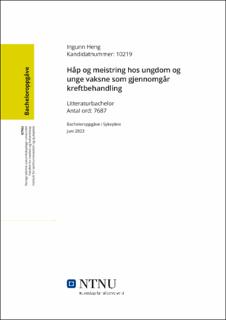| dc.contributor.advisor | Forbergskog, Vesna | |
| dc.contributor.author | Heng, Ingunn | |
| dc.date.accessioned | 2023-07-15T17:21:31Z | |
| dc.date.available | 2023-07-15T17:21:31Z | |
| dc.date.issued | 2023 | |
| dc.identifier | no.ntnu:inspera:146721298:147643701 | |
| dc.identifier.uri | https://hdl.handle.net/11250/3079448 | |
| dc.description.abstract | Samandrag:
Bakgrunn: Årleg får omtrent 300 ungdom og unge vaksne i alderen 13 til 26 år kreft i Noreg. Pasientgruppa utgjer ei sårbar gruppe med særeigne behov. Dei opplever markant dårlegare utfall enn høvesvis kreftsjuke barn og eldre vaksne og rapporterer i større grad negative psykososiale konsekvensar.
Hensikt: Å få kjennskap til korleis sjukepleiar kan understøtte håp og meistring hos ungdom og unge vaksne som gjennomgår kreftbehandling, med særleg fokus på pasientgruppas unike, psykososiale behov.
Metode: Eit litteraturstudium gjennomført våren 2023 basert på ni forskingsartiklar.
Resultat: Ungdom og unge vaksne under kreftbehandling har komplekse medisinske og psykososiale behov. Å bli møtt på desse behova, både dei fysiske og dei psykososiale, var vesentleg for den unges meistring og oppleving av håp. Oppleving av håp utgjorde ein mental styrke som hjelpte dei å meistre kreftbehandlinga. Sosial støtte var den mest innflytelsesrike faktoren på håp og bidrog til auka meistring.
Konklusjon: Varetaking av den heilskaplege helsa til ungdom og unge vaksne kan bidra til at den unge opprettheld håp og meistrar livssituasjonen. Å møte deira unike, psykososiale behov er svært viktig for at dei ikkje skal miste håpet. Sosial støtte utgjer ein sentral faktor i opplevinga av håp og sjukepleiar bør difor oppmuntre og tilretteleggje for sosial kontakt. Fremjing av eit menneske-til-menneske-forhold mellom sjukepleiar og pasient er også med på å auke pasientens håp og meistring.
Nøkkelord: sjukepleie, kreft, ungdom og unge vaksne, håp, meistring, psykososiale behov | |
| dc.description.abstract | Abstract
Background: Annually, approximately 300 adolescents and young adults aged 13 to 26 receive a cancer diagnosis in Norway. This patient group constitute a vulnerable group with special needs. They experience worse cancer outcomes than pediatric and older adult patients and report more negative psychosocial consequences.
Aim: To gain an understanding of how nurses can support hope and coping in adolescents and young adults who are undergoing cancer treatment, hand how to meet their unique, psychosocial needs.
Method: A systematic literature study carried out between April and June 2023 based on nine research articles.
Results: Adolescents and young adults undergoing cancer treatment have complex, unmet medical and psychosocial needs. Meeting these needs, both physical and psychosocial, is essential for the youth’s ability to cope and experience hope. Hope constituted a mental strength that helped them cope with cancer treatment. Social support was the most influential factor in supporting adolescents and young adults to remain hopeful and increased their ability to cope.
Conclusion: Taking care of the overall health of adolescents and young adults can help the person maintain hope and cope with their life situation. Meeting their unique psychosocial needs is crucial in helping them remain hopeful. Social support is a central factor in supporting adolescents and young adults in remaining hopeful. The nurse should therefore encourage and organize for the youth’s chances to maintain social contact. Promoting a human-to-human-relationships between a nurse and the patient is also a way to increase the patient's hope and coping skills.
Keywords: nurse, cancer, adolescent and young adult, hope, coping, psychosocial needs | |
| dc.language | nno | |
| dc.publisher | NTNU | |
| dc.title | Håp og meistring hos ungdom og unge vaksne som gjennomgår kreftbehandling | |
| dc.type | Bachelor thesis | |
